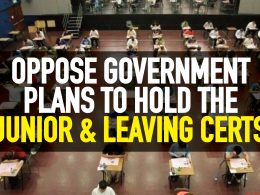By Councillor Ruth Coppinger
PARENTS VOTING on 5 June need to factor in a huge issue that will impact their children’s future but is being largely ignored in the media. When their kids return to school in September, two to three teachers will no longer be there and their school will be thousands of euro poorer. That means bigger classes with less attention for their child and more requests from school principals for parent donations to keep schools running.
Greater Blanchardstown, where I represent, will lose 70 primary teachers, according to the INTO. That’s an average of three per school in the youngest and fastest growing area of the country, with large immigrant populations and big communities of lone parents. Nowhere is educational opportunity more needed. Education is one of the few proven ways to improve your chances in life but the rungs are being knocked off the ladder by this government.
Even during the boom schools were underfunded, with parents in one part of my electoral area requested to fund the heating bills in the school. Only the voluntary effort of parents and teachers has bailed out the government.
In the secondary sector, the average school in Dublin West has been predicted by the unions to lose 3.5 teachers and up to €20,000 in grants. Courses such as the Leaving Cert Applied, designed to retain people in school for longer, will suffer. Ordinary and Higher Level classes will have to merge and schools will have to ditch subjects. Last year in my school a French teacher had to be let go, meaning less students now study a language in the school. So-called minority subjects such as physics will inevitably go. So much for the “knowledge economy” the government wants.

Already students are suffering from the cuts in supervision cover, meaning less out-of-class activities can take place, such as field trips, plays, museum visits etc. These are essential for active learning and for the enjoyment of young people, but clearly the government doesn’t care. It’s lock-down and chalk and talk in the classroom.
The most vulnerable have been picked out first by the government – first the pensioners, now the young. Those with special needs will have supports taken from them. Travellers will find it harder to access schools as outreach teachers are cut.
If the media gave less coverage to attacking teachers, nurses and public sector workers and ditched their daily mantra about cutting public expenditure, then these vital issues could be highlighted and debated. Socialist Party members will remind people on the doorsteps about this burning issue that will impact on every single child in the next school term.










